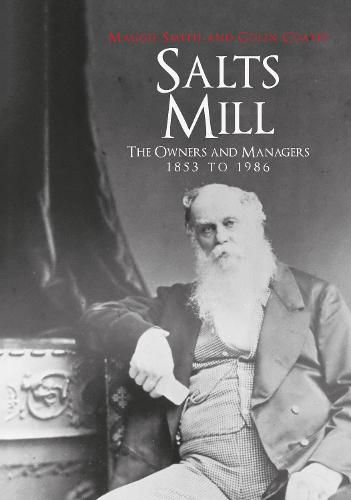Readings Newsletter
Become a Readings Member to make your shopping experience even easier.
Sign in or sign up for free!
You’re not far away from qualifying for FREE standard shipping within Australia
You’ve qualified for FREE standard shipping within Australia
The cart is loading…






Sir Titus Salt built a mill and village in 1853 that continues to be named after him. Already a successful worsted manufacturer in Bradford, his decision to build a huge ‘vertical’ mill commenced a pattern of intertwined fortunes between Salt’s Mill and Saltaire’s residents, one that has continued. It housed all processes from treating raw wool to finishing quality worsted materials, alongside houses and community amenities for his workers.
Ownership of Salts Mill initially passed to Salt’s fifth son but went into voluntary administration in 1892. The mill was rescued and prospered under the ownership of Sir James Roberts until 1918, when family and business tragedies resulted in his sale of Salts Mill to a consortium of Bradford businessmen. During lean times for the textile trade in the 1920s, the private company of Salts Mill was floated as a public company and success returned to the mill. This led to record dividends in 1956, resulting in a dramatic take over by Illingworth, Morris - a company founded by the Ostrer family, who grew a global, multi-national textile company, retaining their headquarters at Salts Mill until textile production ceased. The twists, turns and dramas at Salts Mill are recounted in this book.
$9.00 standard shipping within Australia
FREE standard shipping within Australia for orders over $100.00
Express & International shipping calculated at checkout
Sir Titus Salt built a mill and village in 1853 that continues to be named after him. Already a successful worsted manufacturer in Bradford, his decision to build a huge ‘vertical’ mill commenced a pattern of intertwined fortunes between Salt’s Mill and Saltaire’s residents, one that has continued. It housed all processes from treating raw wool to finishing quality worsted materials, alongside houses and community amenities for his workers.
Ownership of Salts Mill initially passed to Salt’s fifth son but went into voluntary administration in 1892. The mill was rescued and prospered under the ownership of Sir James Roberts until 1918, when family and business tragedies resulted in his sale of Salts Mill to a consortium of Bradford businessmen. During lean times for the textile trade in the 1920s, the private company of Salts Mill was floated as a public company and success returned to the mill. This led to record dividends in 1956, resulting in a dramatic take over by Illingworth, Morris - a company founded by the Ostrer family, who grew a global, multi-national textile company, retaining their headquarters at Salts Mill until textile production ceased. The twists, turns and dramas at Salts Mill are recounted in this book.